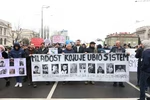Bosnian authorities fail to agree on Reform Agenda, jeopardizing EU growth plan funds

Bosnia and Herzegovina’s authorities have failed to agree on a draft Reform Agenda, a crucial condition for the disbursement of the first tranche of the European Union's Growth Plan, valued at €70 million.
The Working Group for the Reform Plan in Bosnia and Herzegovina has failed to approve the Draft Reform Agenda. Representatives from four cantons did not give their consent to the proposed document, despite the extended deadline granted by the European Commission and exhaustive efforts to reach an agreement over the past two days.
The cantons that withheld their consent are Central Bosnia Canton, Tuzla Canton, Zenica-Doboj Canton, and Una-Sana Canton. Due to their refusal, Bosnia and Herzegovina remains the only Western Balkan country that has not officially submitted a Draft Reform Agenda.
Borjana Kristo, Chairwoman of the Working Group and Chairwoman of the Council of Ministers, emphasized the importance of the agenda: "The European Commission, through Commissioner Varhelyi, granted us an additional deadline for Bosnia and Herzegovina to submit the Draft Reform Agenda, which was these past two days. Unfortunately, despite all the efforts and support from European institutions, it was not enough for everyone in Bosnia and Herzegovina to show a minimal level of political responsibility and direct our activities towards a common European path."
Minister of Transport and Communications Edin Forto expressed his disappointment on social media: “I can’t believe I’m writing this, but the SDA, through its four cantonal premiers, refused to support the reform plan from the Growth Plan.”
Bosnia and Herzegovina is the only country in the region that has not joined this instrument, which allocates up to two billion BAM for the country. The process has been slowed by the need to harmonize 112 points from the Reform Agenda, with some points being contested by the ruling parties from the RS.
This time, conditional approval was withheld by four cantons in the Federation of Bosnia and Herzegovina, which Forto described as the SDA’s decision to hinder Bosnia's path to the EU.
“It seems the citizens reacted too positively to Bosnia’s progress on the European path, and we received too much praise from Brussels. The SDA decided to block the European path and deny funds to citizens and businesses throughout Bosnia and Herzegovina,” Forto added.
The SDA responded, emphasizing the need to include certain crucial points in the Reform Agenda: “The SDA Collegium supported the position of the four canton premiers (TK, ZDK, USK, and SBK) to give conditional approval to the Draft Reform Agenda, which needs to be submitted to the European Commission for further procedure. We believe the Draft Reform Agenda should be agreed upon and submitted as soon as possible but insist that sections regarding the Constitutional Court's decisions cannot be removed. It is unacceptable to erase the term 'state' from the entire document, replace state institutions as key actors with entity-level ones, introduce entity and ethnic vetoes in decision-making where there were none before, and include mainly projects from the RS entity and cantons with a Croatian majority while neglecting those with a Bosniak majority. Meeting the ultimatums from the RS entity cannot produce the necessary Reform Agenda for Bosnia and Herzegovina and its citizens.”
The Reform Agenda is a crucial condition for the disbursement of the first tranche of the EU Growth Plan, valued at €70 million.
Kakvo je tvoje mišljenje o ovome?
Učestvuj u diskusiji ili pročitaj komentare





 Srbija
Srbija
 Hrvatska
Hrvatska
 Slovenija
Slovenija



























































